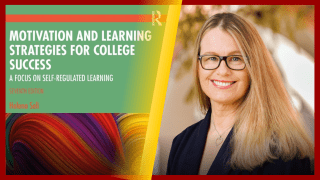Helena Seli is Professor of Clinical Education and USC Rossier Assistant Dean of Program Development. She teaches courses that guide students in implementing educational psychology to advance equity. The seventh edition of her book Motivation and Learning Strategies for College Success: A Focus on Self-Regulated Learning (Routledge) offers helpful tips to students and education leaders supporting a student's academic goals.
Can you tell me what motivated you to write this?
The book is written for the freshman student audience, whether they are in four-year colleges or community colleges, taking courses in-person or online, and attending full- or part-time. As first-year students in a college context, they're going through a big shift in their learning from a teacher-directed to a student-directed environment. Many students struggle with this as they're not prepared for the level of self-regulation required and therefore don't perform optimally.
There are several external factors that impact academic success that can broadly be categorized into social, cultural and historical factors. When it comes to internal factors, at one time, it was thought that intelligence was the main factor determining academic success. We now know from decades of research that self regulation is among the best predictors. The great news is that students can learn how to become more self-regulated and more successful learners by using effective, task-appropriate strategies to manage their motivation, their behavior and learning. Examples of strategies are using meaningful versus rote learning strategies, setting effective goals and very importantly, learning how to combat procrastination. These are the same skills that benefit us throughout our lives, not only in academic settings. The bottom line is that self-regulated individuals control the factors influencing their learning and performance.
This is the seventh edition. What makes this different? What new research or factors went into deciding to write this new edition?
The pandemic in 2020 impacted and still impacts so many of us. The seventh edition focuses on how to implement the learning strategies in media-rich online environments. Due to the pandemic, colleges were forced to go online. Therefore, many colleges started using things such as flipped instruction. The book acknowledges this shift in instructional approaches and environments and focuses on how to learn best in media-rich online environments.
Technology is ever-present in our life. It has been a theme in the prior editions as well, but in the seventh edition, there's an emphasis on the positive and the negative role of technology in learning situations. The book does encourage students to use apps for time management and goal setting but also discusses the cost of technology such as the constant tendency to multitask. Our need to multitask, which is really task switching, comes at a very high cost.
This edition specifically recognizes that more and more non-traditional students, who are 25 years and older as well as students from historically marginalized backgrounds, are entering colleges and universities. The text really acknowledges the strengths as well as the challenges that these students may experience, such as imposter syndrome and microaggressions, and how to address those. Those are the major new dimensions in this edition.
What are the common challenges or opportunities that students face when it comes to motivation and learning?
I'd like to focus on two specific challenges. One of the most common challenges is that many students come to colleges being passive learners and using rote learning strategies rather than as active learners who use meaningful learning strategies. It’s not uncommon for students taking an exam, even though they've spent hours studying, to feel as though they never saw some of the material. In high school, more passive learning strategies may have worked. They definitely don't work in college where students are expected to demonstrate higher levels of analytical and critical thinking.
The other common challenge is really the level of anxiety and the number of students that are struggling with anxiety. We know, based on a seminal national survey, the National College Health Assessment, the percentage of students who reported anxiety as an impediment. Anxiety is particularly high for students from historically marginalized backgrounds, such as students who are transgender or gender nonconforming, with as many as 60% reporting anxiety as a significant impediment.
What strategies or techniques does your book offer to help students improve their motivation and learning abilities?
I'd like to stay with the last challenge that I discussed and the number of students who are experiencing significant enough levels of anxiety where it really becomes an impediment to their academic success and impacts the other areas of their lives as well. The book has an entire chapter dedicated to supporting students in regulating emotions, including managing anxiety. The book presents strategies to manage both the cognitive and the physiological symptoms of anxiety by understanding and changing one's self-talk. What we tell ourselves often is the cause of our emotions and actions. The book also offers ways to manage anxiety from the physiological aspects, such as engaging in deep breathing. The book also emphasizes that most colleges and universities have dedicated centers to mental health, counseling and student support. If the book can remove some of the stigma related to seeking help when a student realizes they need it, such as when they realize their tendency to catastrophize, I know that the book would have succeeded.
Do you use the book in the classes you teach?
I use it in an undergraduate class for freshman students. It is a general education elective that appeals to students who are interested in the topics of learning and psychology and want to learn more about themselves as leaders. We also have two programs that use the book at the master's level: the school counseling and educational counseling programs. These are students who are learning to become counselors in either K-12 or community college settings and whose role is to support students in a holistic sense, including supporting their self-regulation.





